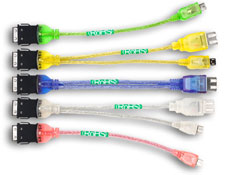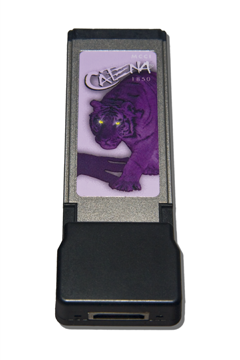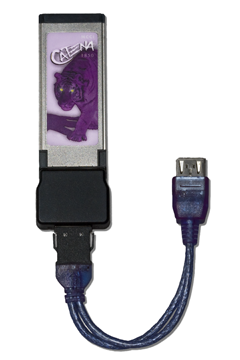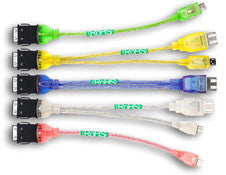MCCI Catena 1850
Regular price
$ 995.00
The MCCI Catena® 1850 gives HS USB On-The-Go (OTG) firmware developers everything needed to prototype OTG firmware in Microsoft Visual C, while working on a Windows XP, Vista, or Windows 7 system.
The Catena 1850 combines a 32-bit ExpressCard interface with an ST-Ericsson ISP1761 Hi-Speed USB Host Controller and Peripheral Controller chip. This controller can be memory mapped through the Windows ExpressCard Root Port. The Catena 1850 allows developers to write register-level code that accesses the ISP1761 just as it would in a target system. Suitable code can then be recompiled and used unchanged on a target embedded system.
The Catena 1850 is ideal for use in early prototyping and proof of concept, development of device class drivers for an embedded host stack, and for evaluating OTG system architectural concepts before product hardware is available.
Software can be developed in a number of "operating system" environments:
- MCCI USB DataPump® portable firmware environment and "os/w32" - this binding for the DataPump simulates an embedded system in the Windows environment. Developed code can be recompiled and directly ported to development platforms.
- MCCI USB DataPump environment combined with Enea's OSE Windows-based simulator. Code developed in this environment can directly port to OSE-based targets.
- Custom environments — readily supported through an abstraction layer.
In addition to supporting OTG development, the Catena 1850 can be used for developing embedded USB device firmware, embedded USB host stacks, or a combination (USB embedded host for embedded peripherals, plus OTG functionality for system expansion). MCCI® supplies five different cable adapters:
- OTG mini A/B (for OTG dual role device emulation)
- Mini B (for OTG or standard USB device emulation)
- OTG mini A/B plus standard USB A receptacle (emulates OTG dual role device plus embedded USB host)
- Mini B plus standard USB A receptacle (emulates USB device plus embedded USB host)
- Dual A receptacle (emulates dual USB host)

Code developed with the MCCI USB DataPump can readily use the ISP1761 to simulate silicon that is under development or not yet available. The silicon independent DataPump architecture allows the underlying silicon to be replaced with no effect on the higher level firmware developed earlier in a project.
The Catena 1850 is packaged in a PCMCIA 34mm ExpressCard form factor.
Related MCCI products include:
- MCCI USB DataPump portable USB firmware environment
- MCCI USB Class Drivers, for Windows and MacOS:
- for CDMA, GPRS, HSPA, WCDMA, and LTE mobile phones
- for Ethernet devices
- for cable modems
- for analog modems
- for serial port migration
- for ADSL modems
- for device firmware update (DFU)
Specifications
| USB Silicon | ST-Ericsson ISP1761 High-Speed USB On-The-Go controller |
| PCIx Bridge Silicon | PLX PEX8311 PCI Express-to-Generic Local Bus Bridge |
| Device Endpoints | Seven IN endpoints, seven OUT endpoints and one fixed control IN and OUT endpoint |
| Interrupts | All interrupts multiplexed onto a single IRQ. All interrupt handling is performed by the Windows 32 application, with minimal kernel overhead |
| Register-Alignment | ISP1761 registers are aligned on 2-byte boundaries in Memory space |
| Operating Modes | OTG Dual Role; USB Device; Dual USB host; USB host + OTG dual role; USB host + USB device |
| Operating Mode Configuration | Automatic, based on the cable adapter plugged in |
| Miscellaneous | Each Catena 1850 is assigned four Ethernet MAC addresses, using MCCI’s OUI. Addresses are accessed by reading the PCMCIA Card Information Structure (CIS) |
Kit Contents
| MCCI Catena 1850 | See Table 1, above |
| USB Cables | Mini A/B; Mini B; OTG Mini A/B plus standard USB A; Mini B plus standard USB A; Dual A |
| Supported USB Host Operating Systems (when Catena is operating as a device) | Windows XP through Windows 7, WinCE, MacOS 9; Mac OS X 10.1.3 and later |
| Warranty | 90 days |
Recommended System Requirements
|
Development System Operating System
|
Windows XP, Vista, or Windows 7
|
|
CPU speed (minimum)
|
300 MHz recommended
|
|
Memory (minimum)
|
64 MB
|
|
Externally Accessible Requirement
|
34mm ExpressCard slot
|










